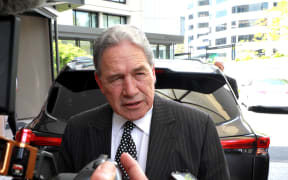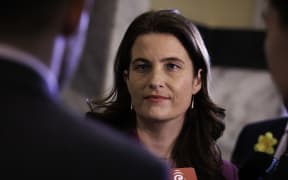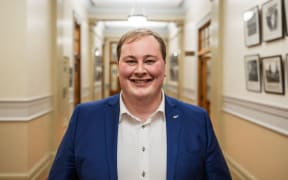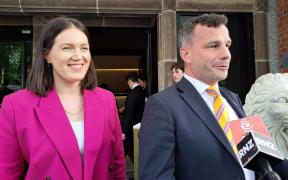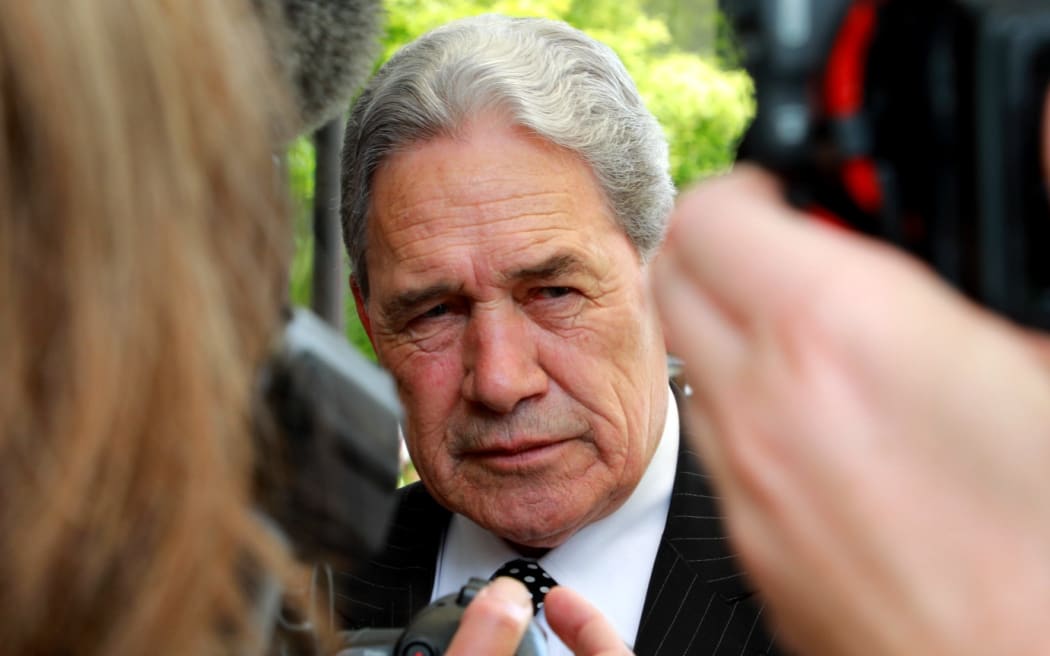
Winston Peters arrives at Cordis Hotel in Auckland for talks with the National Party. Photo: RNZ / Nick Monro
Analysis - Christopher Luxon smiled his way through media interviews this week, giving calm assurances that talks to form his "strong and stable" coalition government were progressing at pace.
He's doing it well. The messaging hasn't changed since day one.
That's despite the obvious difficulties he's experiencing with his potential partners ACT and NZ First - particularly NZ First.
Tuesday didn't go well.
New Zealand First's Winston Peters didn't show up in Wellington for what appeared to be the first planned three-way meeting between the party leaders.
Luxon and ACT leader David Seymour gave the clear impression early in the day that the meeting was on the agenda.
There was no explanation on the day for Peter's absence. His party's MPs were meeting in the capital for a "solidarity meeting", according to Peters' de facto deputy Shane Jones, and Peters missed that as well.
Seymour went ahead and met Luxon, later telling reporters: "Not everyone showed but hey, what can you do?"
That evening Luxon and Seymour flew out of Wellington for Auckland on a late flight, after it had been confirmed that the incoming prime minister wouldn't be going to the APEC summit in San Francisco.
To do that he would have to leave on Wednesday night.
The government announced that Trade Minister Damien O'Connor would represent New Zealand.
Luxon had previously said he would like to attend APEC and would go if he could.
It had become an informal, undeclared deadline for forming the new government, because he obviously wouldn't be able to go if he hadn't been able to seal the deal.
A 'bruising lesson'
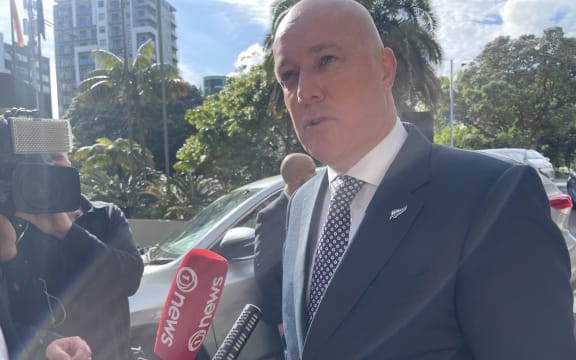
National Party leader Christopher Luxon arrives for coalition talks in Auckland on 16 November 2023. Photo: RNZ / Katie Scotcher
Stuff's Tova O'Brien thought he shouldn't have talked about going in the first place and said Luxon had been taught "a bruising lesson".
"Whatever Luxon's opening offer was to his respective coalition partners, it clearly didn't pass muster," she said.
"It wasn't enough for the prime minister-elect to safely meet his foolhardy self-imposed APEC deadline."
O'Brien put it down to Luxon's political inexperience.
"Luxon may have thought all his experience with 'mergers and acquisitions', which he keeps reminding us about, would have put him in good stead to form a government, to negotiate with a 40-year-veteran of politics who played a key role in forming three other governments," she said.
"He thought wrong."
O'Brien's conclusion that Luxon's opening offer to ACT and NZ First wasn't good enough was echoed in a report filed by Newshub's political editor Jenna Lynch.
"Newshub understands both ACT and New Zealand First were unhappy with being low-balled by National - leading to the great thawing of New Zealand First-ACT relations and multiple meetings of the minor parties," she said.
That's what led to reports last week that the two minor parties were "ganging up" on National, using their combined clout to get a better deal.
First three-way meeting
Wednesday was much better for Luxon.
A three-way meeting had obviously been arranged the previous evening, which accounted for Luxon and Seymour leaving Wellington for Auckland, and it happened as planned, early in the day.
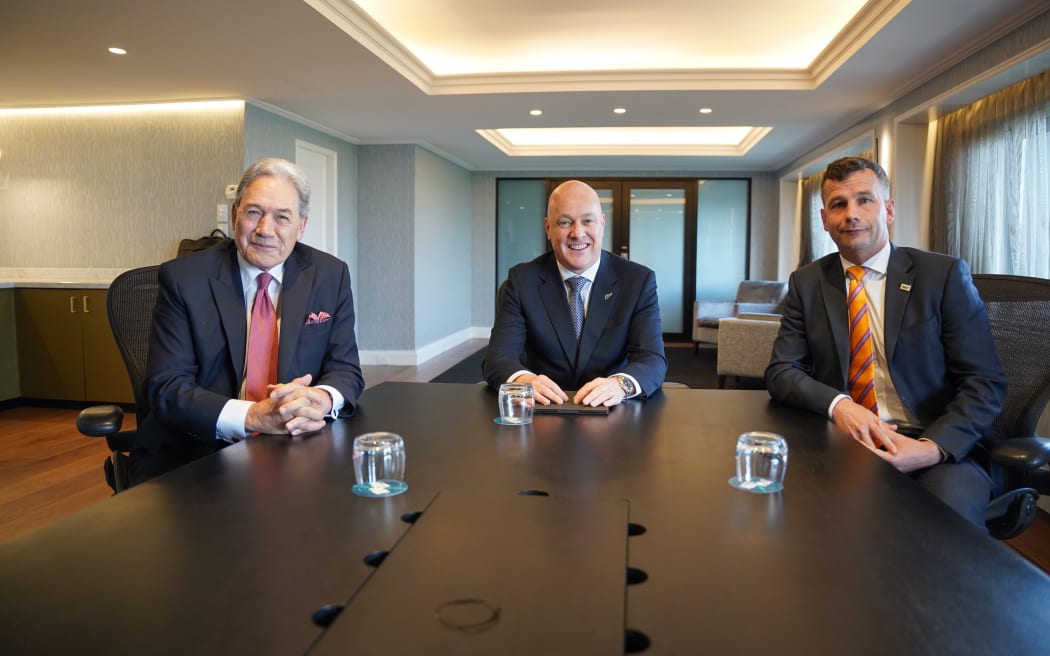
Winston Peters, Christopher Luxon and David Seymour all in a room together for the first time on 15 November 2023. Photo: Supplied
Pictures of the three smiling leaders, sitting together in a room in an Auckland hotel, appeared on social media.
The meeting was their first three-way encounter.
Seymour was reported to have been in the meeting for about an hour while Peters stayed on for a total of about three hours. Later in the day further meetings took place between Luxon and Peters.
Seymour said he didn't need a long meeting.
"It certainly served its purpose of getting us together and getting that dynamic of us three talking about how we can operate together and how a government can function," he said.
"But obviously each of us has quite a lot of detail to work out with each other in terms of how those particular policies and so on will go."
Peters didn't explain his Tuesday absence until Thursday.
He said a foreign minister who had been at the Pacific Island Forum in Rarotonga was heading to APEC and had wanted to see him in Auckland, RNZ reported.
"So I had to cancel five flights to fit in with him, I was never going to Wellington in that consequence, and both Mr Seymour and Mr Luxon know that," he said.
On Friday morning Stuff's O'Brien described Peters' no show as "one of the most stunning and humiliating displays of political brinkmanship".
Luxon having to fly back to Auckland on Tuesday night so a three-way meeting could be held the next day was a "frankly jaw-dropping display of simpering servitude from National".
On Thursday Luxon explained what went on after the three-way meeting, RNZ reported.
"It started with the three leaders coming together, Winston Peters and myself and our chiefs of staff met then for most of the morning," he said.
"David Seymour and I had lunch yesterday talking about a few issues, and then we met with the full ACT team yesterday afternoon - and then Winston Peters and our chiefs, we carried on again at 6 o'clock last night," he said.
"We are making great progress, we're in the final stages."
Promised tax cuts and foreign buyers
It became clear this week that National's promised tax cuts and the way they're paid for was one of the most important issues being thrashed out, probably the most important - and Luxon wasn't getting his own way on it.
The estimated cost is $14.6 billion over four years, and part of National's funding plan when the policy was announced was allowing foreigners to buy expensive properties and tax them on the purchase price.
It estimated that would bring in $740 million a year, a figure which Labour and numerous economists said just didn't stack up.
Implementing it would mean repealing the ban on foreign buyers passed by the previous Labour/NZ First coalition government.
Peters has always opposed selling just about anything to foreigners and probably has public opinion behind him on that, which he knows.
There doesn't seem to be much doubt that he's applying the famous "hand brake" which he used to scupper various policies when he was in coalition with Labour, and National will have to give up on that funding channel.
Herald columnist Matthew Hooton, in an article published last Friday, said National's foreign buyer proposal was completely at odds with NZ First's most fundamental policy position since 1993, and thus was out of the question.
"NZ First negotiators certainly weren't impressed this week when their National interlocutors angrily told them in that case, NZ First would have to find the extra revenue to fund National's tax cuts," Hooton said.
"NZ First says that just isn't its problem."
What happens if National can't use it? Infometrics principal economist Brad Olsen was asked that on Checkpoint.
"I think most likely the two areas you could see are either a phasing in of those tax changes… or you might see a cutback, a further, deeper cutback, in the likes of public sector funding to instead fund that tax relief," he said.
Olsen said all the parties plans and proposals were coming up against reality during the negotiations.
"None of these plans avoid first contact with reality," he said. "They're always good on paper but you're never sure exactly what comes out of coalition negotiations."
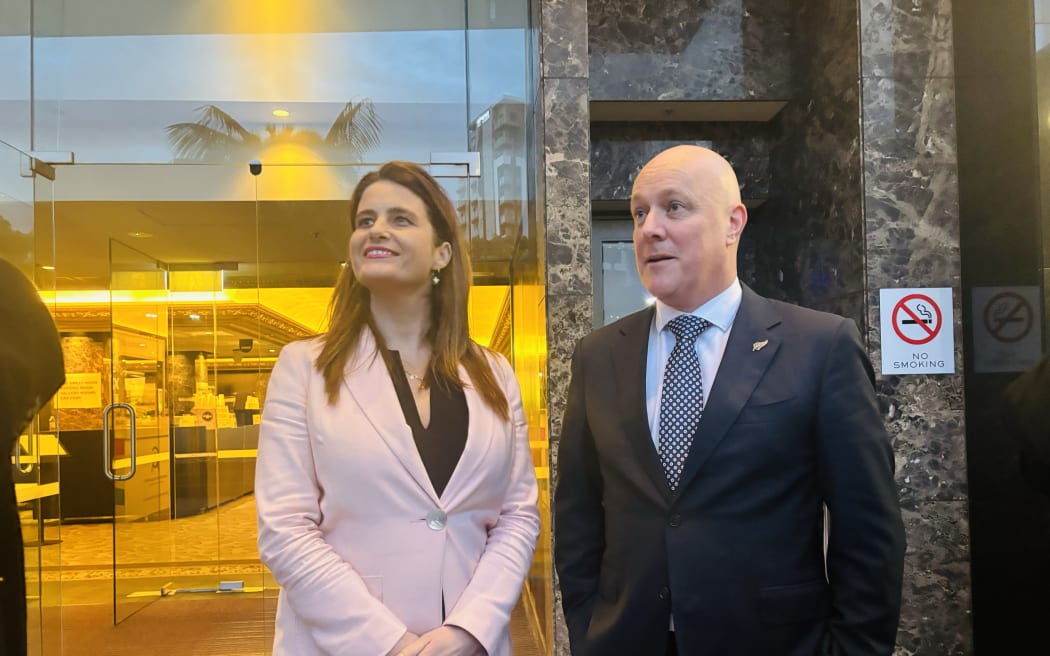
Nicola Willis and Christopher Luxon outside the Cordis hotel in Auckland on 16 November 2023. Photo: Rayssa Almeida
National's deputy leader and incoming finance minister, Nicola Willis, wouldn't commit to the foreign buyers tax when she arrived for the Thursday morning meeting.
"She stood by her commitment to deliver tax cuts for New Zealanders but, despite being asked several times, refused to say it would be funded by a proposal the party campaigned on, a foreign buyers tax on houses sold for more than $2m," RNZ reported.
"Our tax cuts will be funded responsibly, there's really good agreement on that and as you will have seen before the election we went to the election with a manifesto that had a tax policy funded through eight different areas - of reprioritisation, of new revenue measures," Willis said.
"We're discussing every aspect of that."
The 'mini' budget
Earlier this week Willis confirmed she would deliver a mini budget by Christmas despite the slow pace of coalition negotiations.
"I've always put emphasis on the word 'mini' because we're not talking about a budget in the sense of the one you get in May, but more an opening of the books done with the half year economic and fiscal update to see the true state of New Zealand's economy and the government's finances," she told First Up.
"You'll see us introduce legislation before Christmas to respond to our economic situation and get the economy growing again, to deal with the cost of living, (and) so ensure that we're delivering more money into New Zealanders' back pocket."
Labour update
On the other side of the political divide, the Herald's Thomas Coughlan reported on the lead up to Labour's caucus vote that confirmed Chris Hipkins as leader.
"A compromise was reached within the Labour Party to quell dissent about the leadership of Chris Hipkins and allay concerns the party had abandoned its base," he said.
"Almost immediately after the vote, Hipkins confirmed that wealth and capital gains taxes were back 'on the table' for the next election, after Hipkins ruled both out earlier this year."
Coughlan said that confirmation from Hipkins raised eyebrows, because he had been clear that he was ruling those taxes out under any government he led, this year, next year, or after the next election.
"The Herald understands the decision is every bit the u-turn that it appears to have been, and came about as something of a compromise with the disappointed and disaffected group of MPs who were frustrated with the wealth tax decision," Coughlan said.
Inside the meeting, dissenters wanted action on tax, saying it would be difficult to survive the next three years and fight another election if Hipkins' rule-out meant wealth and capital gains taxes were in deep freeze, the report said.
"Hipkins, without much of a fight, agreed to put both back on the table - an olive branch to the dissenters," Coughlan said.
New government incoming
Finally, how long should it take to form a government under MMP?
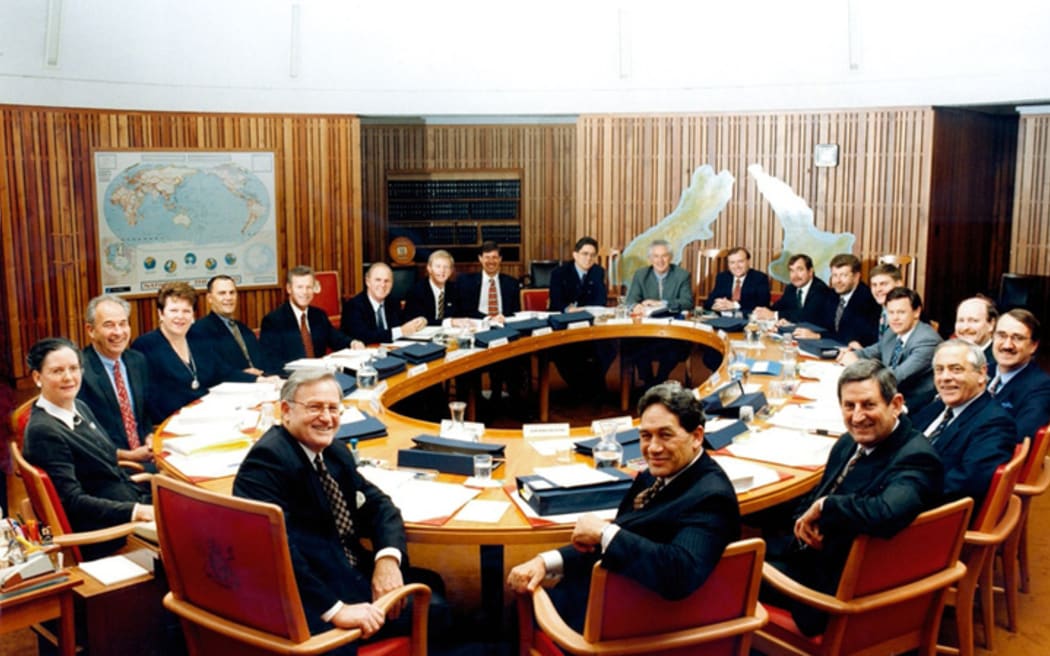
Jim Bolger and Winston Peters at the head of the first MMP coalition government in 1996. Photo: Supplied
Stuff looked at the 10 previous MMP elections and said that excluding 2020 when a rare one-party majority was elected, the average time between election day and the reopening of Parliament was 36.5 days.
The longest was two months in 1996, the first MMP election. That's how long it took National's leader Jim Bolger and Winston Peters to form a government, although at the time Peters was also talking to Labour leader Helen Clark.
The quickest turnaround was in 2011, when John Key was returned as prime minister and continued to work with United Future, ACT and Te Pati Maori. Three weeks after the election Parliament was up and running.
Perhaps we should be thankful and a bit more patient. After Germany's 2017 elections it took Angela Merkel 171 days to form a government.
Belgium holds the record. After their elections in 2010 the country was without a government for 541 days.
*Peter Wilson is a life member of Parliament's press gallery, 22 years as NZPA's political editor and seven as parliamentary bureau chief for NZ Newswire.

